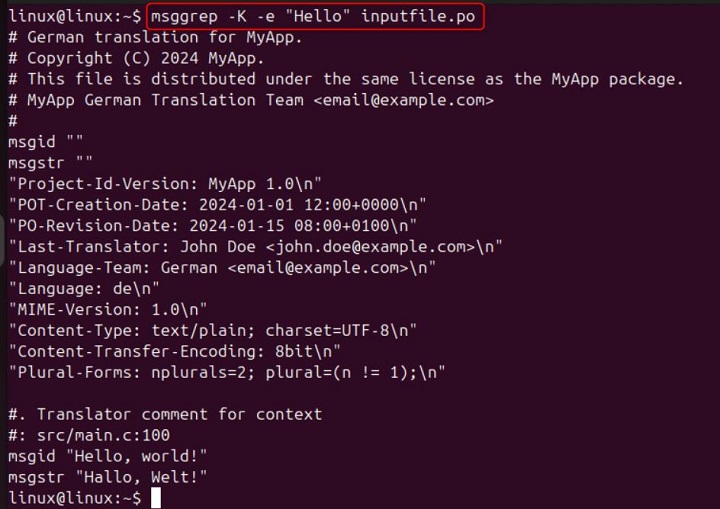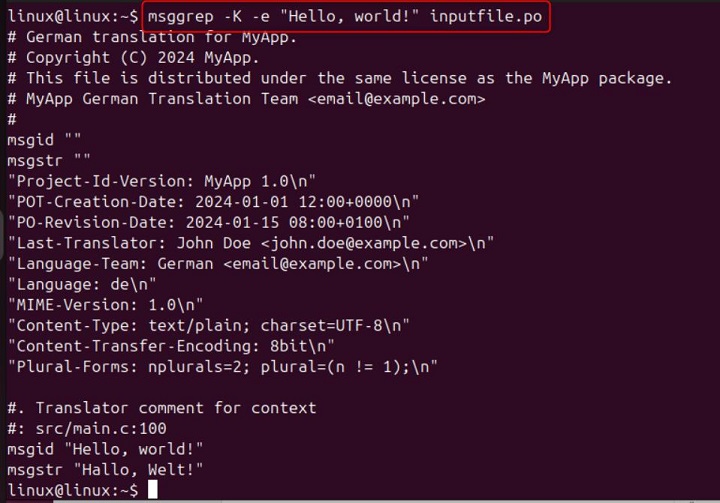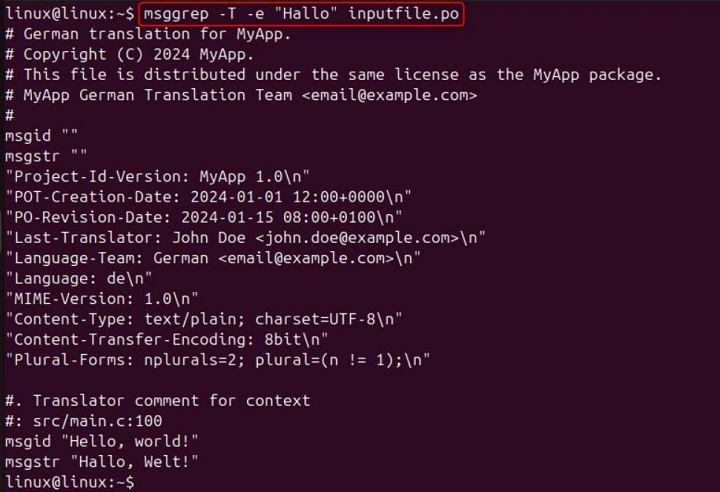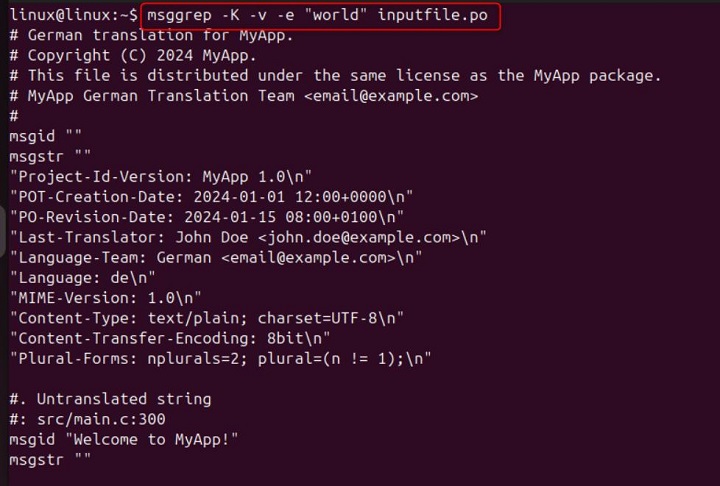
msggrep Command in Linux
msggrep command is used in Linux for searching and extracting specific messages from .po files. As part of the GNU gettext package, it plays a crucial role in software localization by allowing you to filter translation entries based on various criteria. Whether you're looking to isolate specific strings, contexts, or even invert your search, msggrep has you covered.
Table of Contents
Here is a comprehensive guide to the options available with the msggrep command −
Syntax of msggrep Command
The basic syntax for the msggrep command involves specifying the search pattern and the .po file you want to search through.
msggrep [options] pattern inputfile.po
msggrep Command Options
The command offers numerous options to tailor your search. Here are some of the key ones −
| Option | Description |
|---|---|
| -N, --location=SOURCEFILE | Select messages extracted from the specified source file. |
| -M, --domain=DOMAINNAME | Filter messages that belong to the specified domain. |
| -J, --msgctxt | Begin patterns for matching the message context. |
| -K, --msgid | Begin patterns for matching the message ID. |
| -T, --msgstr | Begin patterns for matching the message string. |
| -C, --comment | Begin patterns for matching translator comments. |
| -X, --extracted-comment | Begin patterns for matching extracted comments. |
| -E, --extended-regexp | Treat the pattern as an extended regular expression. |
| -F, --fixed-strings | Treat the pattern as a set of newline-separated strings. |
| -e, --regexp=PATTERN | Use the specified pattern as a regular expression. |
| -f, --file=FILE | Obtain the search pattern from the specified file. |
| -i, --ignore-case | Ignore case distinctions when matching. |
| -v, --invert-match | Output only the messages that do not match any selection criteria. |
| -P, --properties-input | Treat the input file as a Java .properties file. |
| --stringtable-input | Treat the input file as a NeXTstep/GNUstep .strings file. |
| --color | Always use colors and other text attributes in the output. |
| --color=WHEN | Use colors and other text attributes based on the specified condition (always, never, auto, or html). |
| --style=STYLEFILE | Specify a CSS style rule file for coloring the output. |
| --no-escape | Do not use C-style escapes in the output (default behavior). |
| --escape | Use C-style escapes in the output, excluding extended characters. |
| --force-po | Write the .po file even if it is empty. |
| --indent | Output in an indented style. |
| --no-location | Suppress location lines (e.g., #: filename:line). |
| --add-location | Preserve location lines (e.g., #: filename:line) (default behavior). |
| --strict | Use a strict uniform output style. |
| -p, --properties-output | Output the file in Java .properties format. |
| --stringtable-output | Output the file in NeXTstep/GNUstep .strings format. |
| -w, --width=NUMBER | Set the output page width to the specified number. |
| --no-wrap | Do not wrap long message lines into multiple lines, even if they exceed the page width. |
| --sort-output | Generate the output in a sorted order. |
| --sort-by-file | Sort the output based on file location. |
Examples of msggrep Command in Linux
Here are a few practical examples of msgrep command in Linux −
- Basic Search
- Search by Message ID
- Search by Message String
- Invert Match
- Output to a File
Basic Search
To find messages that contain the word "Hello" in a .po file, use the following command: −
msggrep -K -e "Hello" inputfile.po
This command lists all entries in inputfile.po that include the word "Hello".

Note − Ensure to add options like J, K, T, C, or X with the -e option because they define the scope of your search in the .po file. They help specify whether to search within the original strings, translations, contexts, comments, or extracted comments.
Search by Message ID
If you want to search for a specific message ID within your .po file, you can use the -k or --msgid option in msggrep. Here's how you can do it
msggrep -K -e "Hello, world!" inputfile.po
Replace "Hello, world!" with the actual message ID you want to search for. This command will search for all entries in the .po file that match the specified message ID.

Search by Message String
To locate messages by their content, use the -T option −
msggrep -T -e "Hallo" inputfile.po
This command searches for messages containing "Hallo" in inputfile.po.

Invert Match
To find entries that do not contain a specific string, use the -v option −
msggrep -K -v -e "world" inputfile.po
This command lists all entries in inputfile.po that do not contain "world".

Output to a File
To save your search results to a file, use the -o option −
msggrep -K -e "Welcome" inputfile.po -o results.po
This command writes all matching entries to results.po.
Conclusion
The msggrep command is a powerful tool in Linux for searching and extracting specific messages from .po files. It's an essential part of the GNU gettext package and is crucial for software localization.
Whether you need to isolate specific strings, contexts, or invert your search, msggrep provides a robust solution for your needs. With the steps and examples provided, you can efficiently utilize msggrep to manage your translation files.